John Kerry visits Olympia to tout Gov. Jay Inslee’s carbon tax plan

OLYMPIA – Even though President Donald Trump has pulled the United States out of an international agreement on fighting climate change, Washington lawmakers should continue the fight and approve a carbon tax, former Secretary of State John Kerry said Tuesday.
“Washington has an opportunity to lead here,” Kerry said at a brief news conference with Gov. Jay Inslee, who has proposed the tax to generate money to fight carbon pollution.
The Legislature is studying an amended version of Inslee’s proposal, but has only 23 days in its regular session to pass it in both houses.
Trump announced last June the nation was withdrawing from the Paris Climate Accord. Kerry, who helped negotiate that agreement while serving in the Obama Administration, called that a step backward that leaves efforts fight climate change to the states.
Washington and 37 other states are continuing with clean energy plans they already approved, he said.
“Is it better if there was a national plan? Sure,” Kerry said in answer to a question. “But that’s not going to happen right now.”
Inslee’s plan, which would put a tax on fossil fuels that create carbon pollution, has little support from Republicans. They have proposed separate legislation that calls for the state to offer tax breaks to renewable energy and carbon reduction projects, but no new tax.
Because Democrats have slim majorities in both the Senate and the House, they’ll need unanimous support in both chambers if Republicans lock up against Inslee’s proposal. To help Inslee gather support among lawmakers in his party, Kerry met with Democratic caucuses in both chambers after attending a roundtable with business, utility, tribal and labor leaders about the proposal.
Kerry told reporters he wouldn’t advise lawmakers how to spend the revenue a carbon tax would raise. Instead he said they should “come together around a program of common sense.” That could include efforts to reduce carbon emissions, programs for rural parts of the state, and a way to reduce the impact of the carbon tax, which would raise the price of gasoline and utilities, on low-income residents.